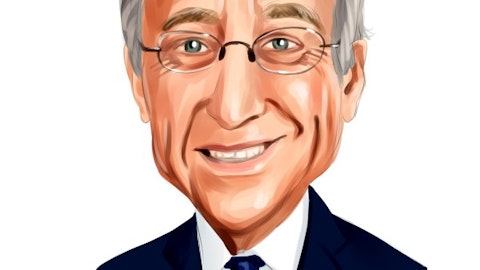
At about the same time we were writing this article (or so we’d like to think), billionaire David Einhorn was preparing his presentation for this week’s Value Investing Congress. In his presentation, he recommended short selling Chipotle. As of this writing, the stock- which was trading at about $400 before it issued its last quarterly report, about $340 when we published our previous article, and about $320 at the market open- was down to about $300. Einhorn’s Greenlight Capital (see many of its long positions from the end of June) reportedly conducted a consumer survey and concluded that Taco Bell (one of Yum’s restaurant concepts) was taking away many of Chipotle’s customers. Einhorn’s presentation flies in the face of much of the hedge fund community: it made our list of hedge funds’ favorite restaurant stocks for the second quarter (see the full rankings). Some of these funds may have sold out over the last three months, but it’s safe to say that many managers are taking significant losses from his announcement.
Chipotle Mexican Grill, Inc. grew its revenue by 21% in the second quarter of 2012 compared to the same period in 2011, including 8% same-store sales growth. Earnings were up 61%, and about half of cash flow from operations was plowed into growth. Yet these results actually disappointed the market, as shown by its decline following the report. Even now it trades at a trailing P/E multiple of 37, implying that the market believes that the $9.5 billion market cap company can maintain a pace of strong growth without being damaged by competition or cannibalizing its own sales. Current year estimates are for $9.01 per share in earnings, and then the sell-side expects a 21% increase in EPS next year over that number. Assuming this trajectory holds, the forward P/E is 28. This figure is still high, and we would expect the stock to decline a bit further.
McDonalds and Yum aren’t exactly cheap (Einhorn specified in his presentation that he was not long Yum despite Taco Bell’s expected capture of market share from Chipotle), but on a quantitative basis they look much better priced. Their trailing earnings multiples are 17 and 21, respectively, which means that you can buy about $1 in historical earnings from each company for the same total price as $1 in earnings from Chipotle. Their recent growth hasn’t been good- McDonalds was about flat in its most recent quarter compared to a year ago, while Yum’s numbers were up slightly- but with forward multiples squarely in the teens, and decent dividend yields (McDonalds’s is 3.4%) we think they are easily better buys for a value investor.
Chipotle Mexican Grill, Inc. is, however, now squarely in the mix with Starbucks and Panera. Its forward multiple of 28 is a bit higher than Starbucks’s 23 and Panera’s 25, but we actually think that its superior growth at least pulls it even with these two peers and may make it the best growth play. Panera turned in 24% earnings growth last quarter versus the same period in 2011, and Starbucks’s corresponding number was 19%. Starbucks is probably too large to maintain growth close to Chipotle’s over the next few years- it may actually be an even better short than the burrito maker- while Panera and Chipotle seem about even as far as being moderately overvalued.
Certainly if Chipotle keeps falling, it is going to reach a buying point. However, we don’t think it is cheap enough yet to warrant a buy, particularly when compared with more mature, lower-priced options. As a consumer we’ll still take burritos over Big Macs any day, but as an investor we think McDonalds is the best pick.





